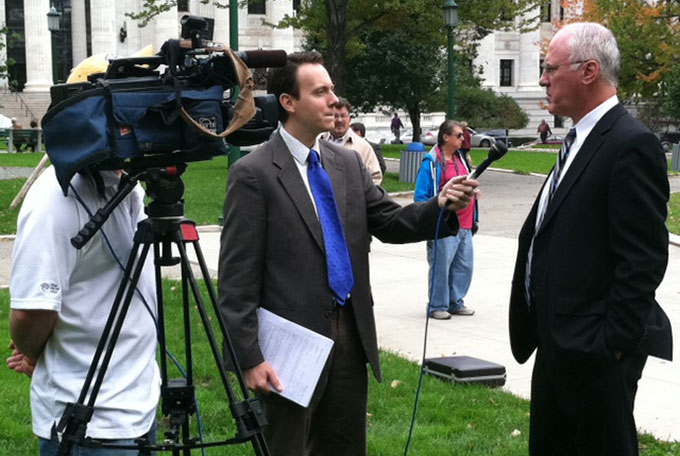The Pork Lawsuit Continues
by Geoff Kelly

Last week, Buffalo attorney and local libertarian pundit James Ostrowski appeared before the New York State Court of Appeals to make his case that the state is iolating its own constitution by providing tax breaks and direct subsidies to private businesses.
In Bordeleau v. State of New York, Ostrowski represents 50 plaintiffs who claim that the state constitution’s prohibition against direct or indirect gifts of state money to private interests—a rule adopted in response to intensely corrupt giveaways to railroads in the 19th century—is systematically skirted by means of the state's hundreds of public authorities: The state gives money or cash-generating properties or credit to the authorities, which then pass on tax abatements or direct subsidies to favored private enterprises or trade associations.
For many, Bordeleau v. State of New York feels like another example of Ostrowski taking a run at a windmill, but those naysayers ought to take a look at the video of last week’s oral argument before the Court of Appeals. The court, particularly Judge Robert Smith and Chief Judge Jonathan Lippmann, relentlessly grilled the counsel for the state, Barbara Underwood, wrongfooting her again and again.
Underwood began by offering two reasons that Ostrowski’s “sweeping challenge” to the way the state subsidizes some businesses in the name of economic development should fail: First, a public authority’s money is not state money, and the authority can do with it what it pleases; second, when the state transfers money to a private entity in exchange for goods or services—later she used the example of an apple growers association mounting a campaign plugging New York apples—that's not a prohibited gift but a contract.
Smith asked her if the practice of the state giving money to an authority like Empire State Development Corporation, and ESDC then making grants to private businesses, did not invite evasion of the constitutional prohibition?
Boardman responded by evoking a 1938 court decision establishing the separate nature of authorities.
“You’re not answering my question,” Smith said. “Doesn’t it invite evasion?”
When Boardman returned to the independence of authorities, Smith interjected, “You object to the word evasion?”
Lippmann asked Boardman if the plain language of the constitution did not prevent the state from doing indirectly what it was prohibited from doing directly. “It may be that in the broadest sense it is doing indirectly what can’t be done directly, but that is what authorities were designed to do,” Boardman replied.
“It sounds like what you’re saying is that you can do indirectly what you can’t do directly, so long as you’ve been doing it a long time and you’re the state?” asked Smith.
Boardman struggled to draw a distinction between the subsidies that precipitated the gifts clause (bond issues on behalf of railroads) and the subsidies the state hands out now (to projects that are supposed to create a public benefit). Lippmann asked how a decision to award a subsidy to apple-growers could be construed as anything but the state fostering private business activity—that is, favoring one private industry over another? Smith asked how many apple growers had to enter a trade association before the state could justify giving the association money while not giving money to apple growers who ere not in the association. Or to pear growers, for that matter, who might feel that the state was giving their competition a leg up.
The court’s interview of Boardman fell short of a savaging but she seemed shaken, nonetheless. The court was far more sympathetic to Ostrowski’s arguments, though one important point was made by Judge Victoria Graffeo: If Ostrowski’s plaintiffs were to win, how would the state compete for new industries and the jobs that come with them?
Lower taxes, said Ostrowski, a response that elicited a brief exchange about politics and policy rather than the facts under the law. Graffeo asked Ostrowski what would happen to projects that have received state subsidies and are underway? Would the funding simply be yanked? That’s a question for someone else, Ostrowski replied, not for the courts.
But it’s the question on which the court’s decision may hang: Even if common sense indicates that the current system of delivering public subsidies to private interests is an end-around the state constitution, who will have the courage to upset the apple cart?
blog comments powered by Disqus|
Issue Navigation> Issue Index > v10n42 (Week of Thursday, October 20) > Week in Review > The Pork Lawsuit Continues This Week's Issue • Artvoice Daily • Artvoice TV • Events Calendar • Classifieds |









 Current Issue
Current Issue